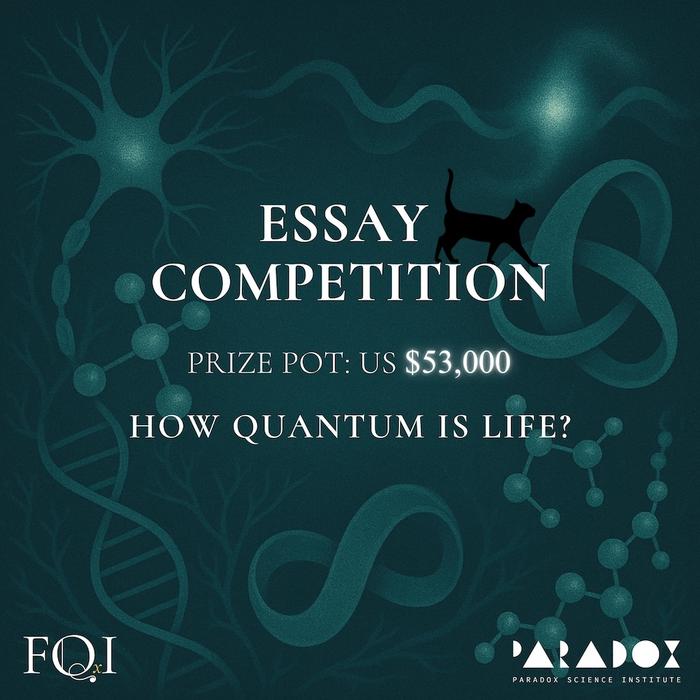
In 1944, Erwin Schrödinger, one of the founding fathers of quantum mechanics, ignited an intellectual revolution with his seminal book What Is Life? The Physical Aspect of the Living Cell. His work laid the groundwork for a complex and controversial discourse at the intersection of quantum mechanics—the enigmatic theory governing the fundamental behavior of matter at microscopic scales—and biology, the science of life. Fast forward to 2025, the United Nations General Assembly, in collaboration with UNESCO, has declared this year as the International Year of Quantum Science and Technology, marking a century since Schrödinger’s pivotal quantum equation transformed our understanding of the microscopic realm. In celebration, the Foundational Questions Institute (FQxI), in partnership with the Paradox Science Institute, has announced a $53,000 essay competition inviting researchers and thinkers to explore the profound question: How quantum is life?
The competition aims to revive and extend the dialogue Schrödinger initiated, probing whether biological systems harness non-intuitive quantum phenomena such as coherence, tunneling, or entanglement to facilitate vital processes. This inquiry is especially pertinent as quantum physics unequivocally underpins atomic and molecular stability, yet its role beyond static structures—specifically in living organisms—remains deeply uncertain. As Jim Al-Khalili, a renowned quantum physicist at the University of Surrey and member of FQxI’s scientific advisory council, notes, understanding whether life evolved to exploit quantum effects could revolutionize both biology and technology. For instance, if photosynthesis leverages quantum mechanics to optimize energy transfer, such insights could inspire groundbreaking advances in quantum computing and communication.
A distinctive feature of this competition is its inclusivity and transparency. Open to scientists and the broader public alike, all submissions will be anonymized during the judging process to ensure fairness and equality among participants. Since 2006, FQxI’s essay contests have cultivated a rich repository of innovative ideas on foundational scientific questions, with this particular initiative marking an exciting collaborative venture with the Paradox Science Institute—a foundation dedicated to probing the fundamental nature of reality through cutting-edge research methodologies. Catalina Curceanu, an experimental nuclear and quantum physicist at Italy’s National Institute for Nuclear Physics, highlights this partnership as a confluence of institutions committed to challenging conventional scientific paradigms.
.adsslot_bOPZ5lqI2w{ width:728px !important; height:90px !important; }
@media (max-width:1199px) { .adsslot_bOPZ5lqI2w{ width:468px !important; height:60px !important; } }
@media (max-width:767px) { .adsslot_bOPZ5lqI2w{ width:320px !important; height:50px !important; } }
ADVERTISEMENT
Quantum biology—a field still mired in speculation and debate—presents unique challenges both experimentally and theoretically. Detecting fragile quantum phenomena within the noisy, thermally agitated environment of living cells demands extraordinary technological sophistication and experimental finesse. Furthermore, theoretical models must account for how such quantum effects can persist and influence biological function without succumbing to rapid decoherence. These hurdles do not deter the quest; rather, they ignite curiosity about quantum coherence in avian navigation, quantum tunneling in enzymatic activity, and the possibility of entanglement playing a role in neural processing or consciousness itself.
The contest invites submissions that tackle these tantalizing questions and more, encouraging authors to propose novel models that integrate quantum thermodynamics within cellular systems. Explorations might include innovative frameworks for measuring complexity and entropy, redefining biological order through quantum principles. Jan Walleczek, scientific director at the Paradox Science Institute, underscores the transformative potential of this research to reveal new insights into the foundations of life, bridging disciplines from physics to biology and even philosophy.
FQxI’s Chief Scientific Officer, cosmologist David Sloan, expresses enthusiasm about fostering intellectual exploration through such collaborative endeavors. This competition represents more than a call for papers—it embodies a fertile nexus for visionary inquiry at the frontier of science that could redefine our fundamental understanding of living matter. Entrants will submit their essays starting June 23, 2025, with a closing date of September 29, 2025. After public posting, entries will be open for voting, with the most compelling essays receiving monetary awards, including a $10,000 first prize. Winners and honorable mentions will be announced in December 2025.
Central to this initiative is the recognition that quantum biology remains on the cusp of scientific maturity. As Al-Khalili points out, unraveling whether quantum effects are mere epiphenomena or integral to biological efficiency could have far-reaching implications. Could mechanisms such as quantum coherence optimize the energy transfer in photosynthetic complexes? Might proton tunneling play a critical role in DNA mutation and repair? And what if quantum entanglement could be linked to cognition, raising profound questions about the nature of consciousness?
Catalina Curceanu further challenges entrants to explore these possibilities, provoking a dialogue on the subtle interplay between quantum physics and neural function. Curceanu’s vision includes groundbreaking theoretical propositions that could reshape approaches to quantum thermodynamics, complexity theory, and the emergent properties of biological matter. This openness to diverse perspectives reflects the transdisciplinary ethos championed by both FQxI and the Paradox Science Institute.
Beyond scientific curiosity, the competition underscores the broader societal relevance of this research. Insights garnered from quantum biology could inspire new generations of quantum-based technologies, propelling advances in quantum computation, communication, and sensing. By harnessing nature’s own quantum strategies, engineers and scientists might design devices with unprecedented efficiency and functionality.
However, the speculative nature of quantum biology also invites skepticism. The difficulty of isolating pure quantum effects in warm, wet, and noisy biological environments frequently fuels debate regarding the legitimacy and significance of this field. Yet, as Al-Khalili emphasizes, dismissing quantum biology prematurely would ignore the potential paradigm-shifting discoveries lying at the convergence of life and quantum mechanics. The ongoing quest is as much philosophical as it is empirical, pushing the boundaries of how science conceptualizes life itself.
In light of these grand challenges and opportunities, the FQxI-Paradox Science Institute essay competition emerges as a catalyst for bold, imaginative thought. The initiative welcomes essays that dare to reconceptualize biological phenomena through quantum lenses, helping to carve pathways into a nascent but promising scientific frontier. It invites contributions that push against disciplinary silos and champion innovation at the crossroads of physics, biology, and beyond.
As the world marks the centennial of quantum mechanics’ birth and embraces the International Year of Quantum Science and Technology, this competition reflects a global scientific community eager to revisit and expand Schrödinger’s visionary inquiries. It stands as a call to researchers, theorists, and creative thinkers worldwide: How quantum is life, indeed?
Submissions and further details, including guidelines and eligibility criteria, can be accessed at FQxI’s dedicated competition portal, officially opening on June 23, 2025. This call to expand humanity’s understanding of nature’s deepest secrets promises to invigorate the fields of quantum science and biology alike, setting the stage for discoveries that could transform science for decades to come.
Subject of Research: Exploration of quantum mechanics’ role in biological systems and the foundational aspects of life through an essay competition.
Article Title: How Quantum is Life? Announcing the $53,000 Quantum Biology Essay Competition.
News Publication Date: 2025 (precise date not specified).
Web References:
Foundational Questions Institute (FQxI): https://fqxi.org
Competition Details: https://qspace.fqxi.org/competitions/introduction
Paradox Science Institute: [No direct web link provided]
Image Credits: © FQxI (2025)
Keywords: Quantum Biology, Quantum Mechanics, Schrödinger, Essay Competition, Photosynthesis, Quantum Coherence, Entanglement, Quantum Tunneling, Foundations of Life, FQxI, Paradox Science Institute, Quantum Thermodynamics.
Tags: $53000 essay contestcoherence and tunneling in living systemsentanglement and life processesexploration of quantum concepts in life sciencesFoundational Questions Institute competitionimplications of quantum physics in biologyinterdisciplinary research in quantum scienceInternational Year of Quantum Science 2025quantum mechanics and biologyquantum phenomena in biologyrelationship between quantum theory and living organismsSchrödinger’s What Is Life


